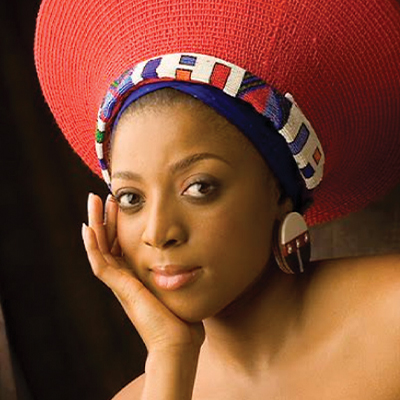
Podcast Transcript
Jordan Rich (JR): Welcome to the FFI Practitioner. I’m Jordan Rich. Today we feature Princess Nandi, who is part of the 2086 Society’s grant to the Nomadic School of Business. She is a distinguished member of the Zulu Royal Family, the fourth child among seven siblings. On today’s podcast, she’ll be talking to us about rich cultural heritage that is deeply rooted in the Zulu traditions, as well as her own activities in philanthropy and as head of the Princess Nandi Zulu Foundation. So let me begin by asking you to very briefly describe your role in the Zulu nation, if you will. How do you describe your place in Zulu?
Princess Nandi (PN): That’s a difficult one to talk about because I just see myself as a very simple woman, and I see myself as a servant of the nation. Besides that I come from royalty, I have had an opportunity to just interact with people and just be who I am, understand the people on the ground, and that is simply how I can describe myself. I’m not a person who carries the crown. Yes, I am royal, but I resonate so much with the simplicity of life and the beauty of life. Besides the fact that I come from a hierarchy of very powerful men and women of the Zulu nation, which is truly an honor for me, I resonate so much with the way they lived. They were proud people, in the sense that they really took pride in who they were, in their culture, their hospitality, their kindness, their compassion for the people, their diligence, and also for wanting to unify the Zulu nation. I feel I come from very inspirational people.
JR: You’ve touched on the amazing legacy of the Zulu people. Why is legacy so important?
PN: To carry the baton is so crucial in our family, because that is the way we live. It guides our lifestyle, it guides the way we interact with people, and the way we uphold ourselves within the family, within the community, and within the nation. It also teaches other people to be in the same space. We tend to lose the fiber of who we are, based on today’s societal expectations, and yet knowing how your forebears lived, it guides you into your future. Holding that as the basis of life is so important.
JR: Princess, you have certainly stepped into the modern world while retaining your cultural legacy. You’ve attended university, and you have a public relations degree. Comment if you will on the synergy between the old and the new.
PN: We cannot shy away from the fact that education is important, but I always say the piece of paper, your degree, your honors, they really do not mean much if you do not understand the background that you come from. I feel that it complements everything, it balances your life. It teaches you that you need to understand what’s going on in the world, but at the same time, merge that with your background, with your culture, with how you are being brought up by your family, by society, by the community. The education that you get from your home, from the community, is even more important.
PN: I started this foundation when I was twenty-one. I was still at university. I was just navigating myself within the outreach programs within the university. And when I went home, I started doing these little parties in the children’s ward. I wanted to start something that would be easy to do, and then graduating to important things, like fighting for the environment, fighting for water, we still struggle [for water] in Africa. It’s so hot, and people still get water from the rivers. We try to get access to water for them, pushing the narrative of understanding culture, understanding education, talking about teenage pregnancy, talking about the way people behave, pushing the issue of getting education, because you still get a lot of dropouts, and quite a high rate of illiteracy.
I’m also an advocate for sports. I’m a golfer. I teach kids how to play golf. I fight for the environment. I work with Project Rhino. You know, animals are very important in our community, and currently I’m writing my children’s book. So, I am an all-rounder. All I want is strength and energy to do so much, because somehow, I just feel that there are people who lag behind, and I’m always wanting to be in the forefront, and I can pull as many people as I can, to push all the narratives that I can within the society, because there is just so much. Also, the most important is mental awareness. There’s quite a lot of pressure, unnecessary pressure, for the people to live, and I always preach the gospel of living simply. It is the best way to live. You don’t have to follow social media, to follow what people are pushing. It is very, very important to live simply. That’s what my foundation basically is about.
JR: It’s a great message, and that leads me to a question I’ve asked all of the guests in this FFI series, and that is your definition of wealth. Tell me what you define as wealth in your world.
PN: That’s very tricky one, because people assume wealth is driving a certain car, living in a certain area with marble floors and crystal chandeliers. But for me, I think being surrounded by the people that love you, people that understand you, and people that will be able to tell you when you are getting off track and guide you with honesty. That is the wealth: where I can sit and just meditate and pray, go sit by the river, and simply enjoy life—enjoy nature and find meaning in changing people’s lives. You can have everything, but when you are having issues mentally, that money cannot go into your brain and fix everything. You just need to be surrounded by people who are going to hug you, sing with you, love with you, and take you to places where you really see what it’s like to have nothing and see how happy those people are. For me, that is wealth.
PN: The most important thing is the fact that you were born, there is so much that you can offer. All we need to do as a society is to always find strength. For me, strength is so important because it’s not even about being able to carry certain things, but it’s about being resilient in the times of trouble. As we can see in the world, there’s quite a lot that is happening. And the most important thing is to find peace in the midst of the turmoil. And how do you do that? It’s important to find people that are honest, truthful, and who are going to honor you as a person, because being honored is very, very important. When somebody honors you, they are able to be truthful and to guide you into the right direction without looking at the crown, you know, trying and tiptoeing around you just to impress you. People that are honest, having true, honest friends is so crucial.
Those people come towards your life by miracle, because sometimes you’ll even be in the midst of family, sometimes extended family, but they don’t look at you that way. Number one, we need to understand they’re also human. The fact that they are your siblings does not mean that they’re going to be for you. In life, you will have your own life, you will have your own friends, you will start your own family. So, it’s important that you are able to navigate and understand that people are different out there. They come from different backgrounds.
All these prayers attract what you want to offer. Set the intention out there to have a better life, to manage the situation. That is all that is important, to support each other in the midst of everything, because that is where we need each other the most. Sometimes I say, when things are all nice and rosy, when everybody is blissfully happy, we forget. But when there’s turmoil, this is an opportunity for us to bring ourselves together and to strengthen ourselves. There’s so much power in the storm, because once it quiets down, you can see clearly what happened. Then you start picking up the pieces, you start rushing to unite. There is so much strength in the storm, because we are all affected the same. It doesn’t matter whether you live in a palace with strong walls or you’re living in a hut with thatch and mud, we’ll all feel the storm. Everybody needs to get out and see what is happening. Let’s go and clean it all up. And that’s how we form friendships. That’s how we get to know each other. That’s how we get to understand who’s doing what, where. That’s how friendships are formed. Friendships are not formed when everybody is sitting and having a nice time. Friendships are truly formed when there’s a storm.
JR: Princess Nandi, thank you so much for this informative and fascinating conversation. You can join Princess Nandi for a virtual seminar on November 12th. To register, go to www.ffi.org, and learn more about this FFI Practitioner podcast and other podcasts at ffi.org as well. This is Jordan Rich, as always. Thank you for listening.




